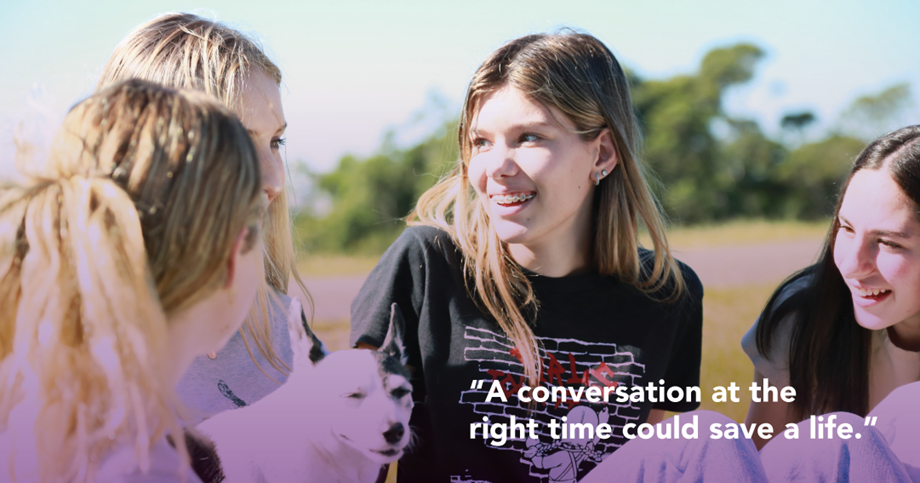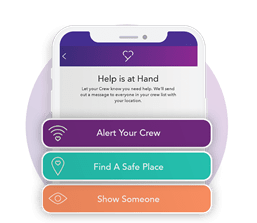Tackling the fears and anxieties that stop people asking ‘Are you okay?’

Asking a friend or family member ‘Are you okay?’ can be difficult.
We are often fearful of the response, fearful of our inexperience in understanding complex mental health issues and fearful of overstepping or upsetting our loved ones.
But a conversation at the right time could save a life.
Family and friends play a vital role in identifying and supporting a young person in distress. Research has shown that having a strong support network is essential to creating longer-lasting, positive outcomes for young people needing mental health support.

But sensitive conversations between you and the people you care about can feel challenging at the best of times, particularly when you are discussing a topic like mental health.
Understanding what stops us from having these conversations and equipping ourselves with the knowledge of what steps to take are important to ensure young people feel safe and empowered to take action.
So what are the fears and anxieties that stop us from asking this important question, and how can we overcome them?
I don’t know how to ask
One of the biggest reasons we don’t ask how our loved ones are is because we think we don’t know how to. ‘When is the right moment? Where should I ask them? What exactly should I say?’
“Helping a loved one access support when they are not okay, doesn’t mean you have to provide the support and advice yourself.”
There is no single way to have these conversations; different approaches can work for different people. What is important is that it feels natural to you. Focus on conversation starters. These can be as simple as, ‘I’ve noticed you don’t seem like yourself lately. Is everything okay?’ or ‘It’s been a big few weeks/months; how is everything with you?’ If you have noticed something has changed with their mood or interactions with you, talk about what you’ve noticed as it helps them to understand where you are coming from and encourages them to open up.
I don’t know how to respond
Sometimes it is not the question we are afraid of asking, but rather what to follow up with if our loved one tells us they aren’t okay. What questions do we ask next, and how can we provide support if we feel we don’t know what to say?
A way to think about this is to use the listen, validate, support action and follow-up framework. This means providing the space they need to speak freely and listening to what they have to say without judgement. Let them know that their feelings are valid and encourage them to take action to get the right support they need. You don’t need to take on a counselling role to try and help problem-solve what they are going through; rather, encourage them to access support services. This could be going together to chat with an adult supporter or parent if you are a friend, speaking with a teacher or school counsellor or going to the doctor together.
If you are unsure of what support services are available, YourCrew’s Pathways to Help empowers you to confidently navigate what to do in different scenarios and provides instant access to crisis support helpline links if you feel it is an emergency.
I don’t want to overstep or offend
‘What if I tell my loved one that I’ve noticed they seem different lately, but they haven’t noticed a change within themselves or are defensive in their response?’
Supporting and validating your loved one’s feelings is an important action in this scenario. Acknowledge their feelings, as it may indicate that they are not ready to talk, but it isn’t a sign to back off completely if you are genuinely concerned for their wellbeing. If you aren’t already Crewing for them, you could encourage them to download YourCrew to ensure they have a strong support network in place for when they are ready to open up, and if they need to, they can access crisis support service links instantly.
I don’t want to make the situation worse
A common misconception is that asking how someone is feeling could make their situation worse, particularly if we don’t feel educated enough on mental health issues. The only way the situation can be made worse is by not saying anything at all. Ignoring the question can reinforce negative feelings about themselves and lead to further destructive thought patterns. For many who are struggling with mental health difficulties, it can be a relief that someone has noticed how they are feeling, even if they aren’t ready to open up.
If you are genuinely concerned they are in distress and won’t talk about it, it is important that you voice your concerns directly. YourCrew’s crisis section provides you with advice on what to do, including links to 24/7 professional services like Kids Helpline, Lifeline and Headspace to refer them to support. If it is an emergency, always call 000.
I don’t know what I can do to help
‘So what action do I need to take next if my loved one has confided in me and I have referred them on for support?’
Once your loved one has taken action, you can continue to follow up with them to see what progress they are making and to let them know that you are there for them to support. Crewing for them on YourCrew is a great way to do this. It is important to remember you don’t need to be an expert in this scenario, and you’re not required to treat the problem.
If you have had a conversation and referred them to a professional service or someone who can help, following up with them at regular intervals in YourCrew and/or, if you feel comfortable, face-to-face to see how they are going is a great way to let them know you are still there for them and interested in how they are going. If the problem escalates, crisis support services are available.

Getting ready to reach out
If you feel more confident about when and how to have a conversation with a loved one, that’s great! Make sure you also look out for yourself to ensure you can handle the different scenarios that may arise depending on how your loved one is feeling. Ask yourself:
- Am I in a good headspace?
- Can I give time, and am I willing to listen?
- Do I feel prepared with how I will respond?
- Do I know where and when a good time to ask would be?
YourCrew can open up conversation
Finding the right moment to have an in-person conversation can still be difficult even when we feel prepared and understand why we feel anxious about reaching out.
If you struggle to ask these questions face-to-face or feel like you need support yourself, YourCrew is a safe digital tool to help you feel empowered to support a loved one or reach out for help when you need it. It has been designed to help open up the conversation about mental health and ensure access to a strong support network and professional help services is available at the click of a button to stop the small things from becoming big problems.
